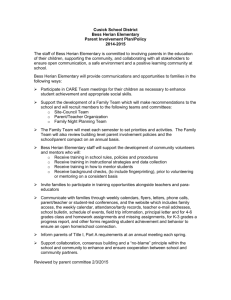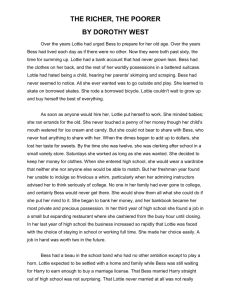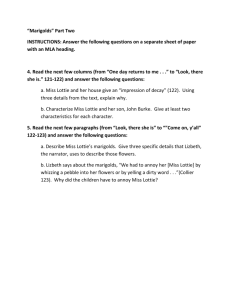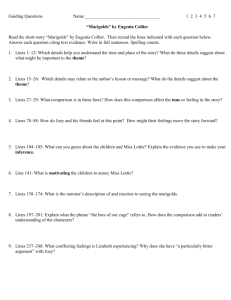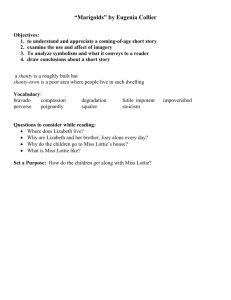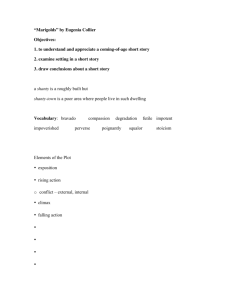Introduction to the text
advertisement
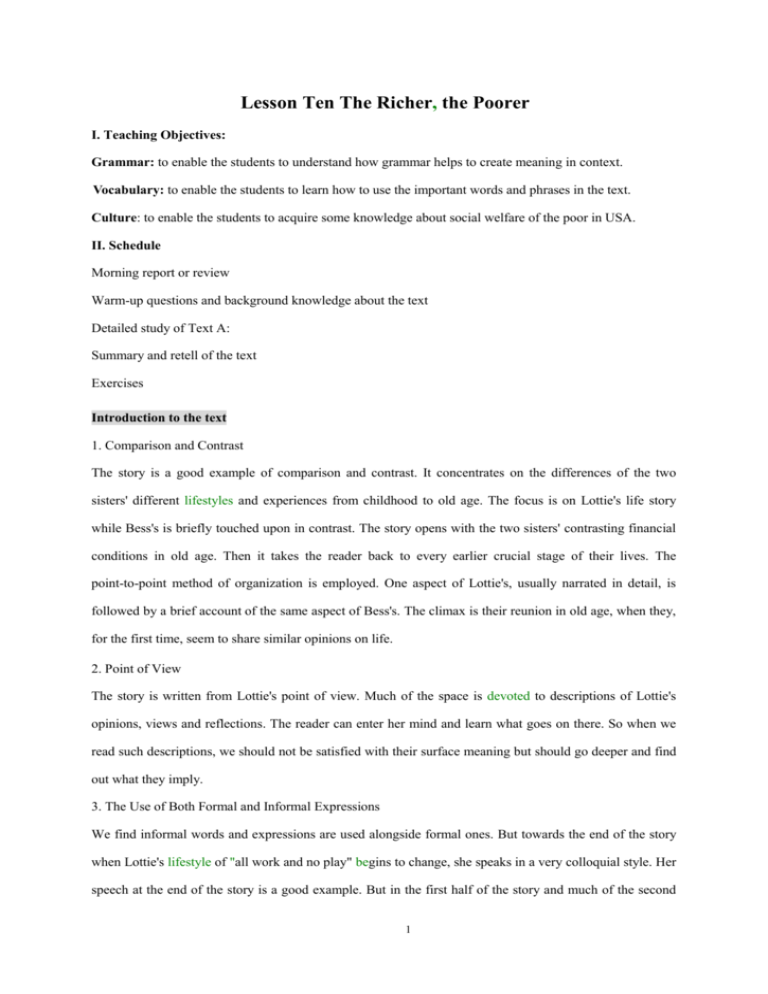
Lesson Ten The Richer, the Poorer I. Teaching Objectives: Grammar: to enable the students to understand how grammar helps to create meaning in context. Vocabulary: to enable the students to learn how to use the important words and phrases in the text. Culture: to enable the students to acquire some knowledge about social welfare of the poor in USA. II. Schedule Morning report or review Warm-up questions and background knowledge about the text Detailed study of Text A: Summary and retell of the text Exercises Introduction to the text 1. Comparison and Contrast The story is a good example of comparison and contrast. It concentrates on the differences of the two sisters' different lifestyles and experiences from childhood to old age. The focus is on Lottie's life story while Bess's is briefly touched upon in contrast. The story opens with the two sisters' contrasting financial conditions in old age. Then it takes the reader back to every earlier crucial stage of their lives. The point-to-point method of organization is employed. One aspect of Lottie's, usually narrated in detail, is followed by a brief account of the same aspect of Bess's. The climax is their reunion in old age, when they, for the first time, seem to share similar opinions on life. 2. Point of View The story is written from Lottie's point of view. Much of the space is devoted to descriptions of Lottie's opinions, views and reflections. The reader can enter her mind and learn what goes on there. So when we read such descriptions, we should not be satisfied with their surface meaning but should go deeper and find out what they imply. 3. The Use of Both Formal and Informal Expressions We find informal words and expressions are used alongside formal ones. But towards the end of the story when Lottie's lifestyle of "all work and no play" begins to change, she speaks in a very colloquial style. Her speech at the end of the story is a good example. But in the first half of the story and much of the second 1 when Lottie is working wholeheartedly to prepare for her old age, the writer uses more formal words and expressions. Detailed Study of the Text Part I (Para 1 ) The two sisters’ contrasting financial condition 1. Over the years Bess had lived each day as if there were no other. Over the years in spite of her sister's urge to prepare for her old age, Bess seized every minute to enjoy herself as if she would die the next day. Obviously, Bess had been acting on the hedonist 快乐主义者, 享乐主义者 motto "Eat, drink and be merry for tomorrow we die". The sentence could mean something very different. Read the following sentence from Helen Keller's "Three Days to See". Sometimes I have thought it would be an excellent rule to live each day as if we should die tomorrow. Such an attitude would emphasize sharply the value of life. 2. Lottie had a bank account that had never grown lean. Lottie always had quite a sum of money deposited in the bank. lean (adj. ): small in amount or quality; meagre 3. Bess had the clothes on her back, and the rest of her worldly possessions in an old suitcase. All that Bess had to her name was the clothes she was wearing and an old suitcase that contained all her other belongings/all the other things she owned. one's worldly possessions/goods: things a person owns worldly: of the material world Part 2 (Paras 2-19) Recall on every earlier crucial stage of their lives 4. Lottie had hated being a child, seeing her parents constantly worrying about money. Bess had never seemed to notice. Lottie knew that her parents was always worrying about money and she knew what it felt like to lack it, so she wanted to grow old enough to earn money. But Bess never seemed to notice her parents' worries and cares. seeing her parents constantly worrying about money: a present participle phrase, used as an adverbial of reason explaining why she hated being a child 2 5. She looked after babies, she ran errands for the old. She earned some money by babysitting and making short trips for old people. go on/run errands for sb. : to go somewhere for other people to take a message, to buy sth. to deliver goods, etc. , e. g. When I was a child, I liked to run errands for my parents. Sorry, at the moment I have no time to go on errands for anybody. 6. She never touched a penny of her money, though her child's mouth watered for ice cream and candy. She never spent a penny of what she had earned on ice cream and candy, though as a child, she wanted very much to have them. water (v. ): (esp. of the eyes and mouth) to form or let out water or watery liquid, esp. tears or saliva e. g. At the sight of the roast duck, my mouth watered. Whenever I pass that factory, my eyes water. 7. When the dimes began to add up to dollars, she lost her taste for sweets. When her savings grew considerably, she was too old to want candy any more. add up to: to amount to? to make a total amount of; to lead to a particular result? e. g. Her savings add up to $2,000. The company's profits last year add up to 5 million yuan. Individuals' small contributions can add up to great help for the needy. It's only a drop in the ocean and won't add up to much for the project. Cultural Note: In the U. S. and Canada, a dime is a coin worth ten cents. Other coins that are commonly used are quarter, worth 25 cents, nickel, 5 cents, penny, one cent. There are also coins, worth 50 cents and 100 cents that are called half dollar and dollar. 8. By the time she was twelve, she was clerking after school in a small variety store. At age 12, she was already keeping accounts in a small variety store after school. clerk (v.); to keep records or accounts, or to do general office work Cultural Note: In the U. S. a variety store is a shop which sells many different kinds of goods, often at low prices. K-mart and Target are famous variety stores. 3 9. She decided to keep her money for clothes. When she entered high school, she would wear a wardrobe that no one else would be able to match. She decided to keep her money to buy clothes when she started high school. Then no other girls in her school would have more and better clothes to wear than she did. wardrobe: a collection of clothes especially of one person or for one activity 10. But her freshman year found her unable to indulge this fantasy, particularly when her admiring instructors advised her to think seriously of college. But in her first year at high school, she found that she couldn't allow herself to spend her money on clothes. She thought of going to college, especially when her favorite teachers advised her to do so. freshman year: (AmE) a student's first year at high school, college or university 11. She would show them all what she could do, if she put her mind to it. If she made up her mind to do that (to go to college), she would show all her family how much she could achieve at college. put one's mind to sth. /set one's mind on sth. : to concentrate on sth. or to be determined to achieve sth. , e. g. She's put her mind to improving her pronunciation. • I'm sure you can do anything if you set your mind on it. 12. In her third year of high school, she found a job in a small but expanding restaurant, where she cashiered from the busy hour until closing. In her third year of high school, she found a job working as a cashier in a restaurant from the busy hour until it closed. It was a small restaurant but its business was growing fast. 13. ... Lottie was faced with the choice of staying in school or working full time. Lottie had to give up either high school or her job, as the rapidly growing business required her to work full time. 14. She made her choice easily. A job in hand was worth two in the future. She made her choice without the slightest hesitation. To have a promising job now was surely far more 4 worthwhile than college. easily: without doubt 15. ... who had no other ambition except to play a horn. who was not ambitious, and satisfied if he could play a horn. 16. Lottie expected to be settled with a home and family while Bess was still waiting for Harry to earn enough to buy a marriage license. With her savings in the bank, Lottie wanted to get married and settle down for a comfortable life while Bess's boy-friend couldn't even earn enough money to get a marriage license. Or: When Lottie was financially ready to get married and settle down, Bess's boy-friend couldn't even earn enough money to get a marriage license. , marriage license: an official document which people must get before they are allowed to marry 17. That Bess married Harry straight out of high school was not surprising. That Lottie never married at all was not really surprising either. It was not surprising that Bess married Harry as soon as she left high school. It was not at all surprising either that Lottie never got married. The two noun clauses introduced by "that" are used respectively as the subject of the two sentences. More examples: That anyone should believe such nonsense seems unthinkable. That he rejected the offer was/is natural. This structure is used in formal English to comment on a fact. In less formal English, we often add "the fact" to the that-clause, which then becomes an appositive clause. The fact that anyone should believe such nonsense seems unthinkable. . The fact that he rejected the offer was not surprising. But the normal way of commenting on a fact is to use an anticipatory "it". It seems unthinkable that many people should believe such nonsense. It was natural for him to reject the offer. straight out of high school: immediately after graduating from high school straight + adv. /prep. : directly, esp. without delay, e. g. He went straight home without stopping at his favorite saloon. 5 He met the director straight after the lunch break. 18. Two or three times she was halfway persuaded, but to give up a job that paid well for a homemaking job that paid nothing was a risk she was incapable of taking. Two or three times, urged by others, she thought seriously about marrying, but she didn't because that would mean she had to give up a well-paying job and become a housewife/home-maker who didn't get paid for all the work she did. This was something she couldn't make herself accept. 19. Bess's married life was nothing for Lottie to envy. Bess's married life didn't make Lottie to envy her. Or Lottie didn't envy Bess her married life> for it wasn't attractive to her at all. Learn to use the word "envy" in the following patterns: envy + direct object; envy + indirect object + direct object Examples: I envy their good luck. She didn't envy him his rich and powerful connections. 20. She and Harry lived like gypsies, with Harry playing in second-rate bands all over the country, even getting himself and Bess stranded in Europe. Bess and Harry never settled down. To make a living, Harry played in second-rate bands all over the country. Once Harry and Bess were left extremely helpless in Europe, and they didn't even have money enough to return home. Cultural Note: Gypsies live in most European countries, but very few gypsies live in the U. S. Gypsies typically do not live in one place, but travel from place to place while living in a caravan. In the past their caravans were pulled by horses, and were usually brightly painted. Gypsies do various jobs to make a living, but traditionally they are thought of as horse traders, musicians, basket makers, and fortune tellers. In the U. K. some people do not trust gypsies and treat them with disapproval, because the gypsy way of life is so different from the way most British people live. In the U. S. , people imagine that gypsies have a very interesting life, traveling, and not worrying about money. 21. They were often in rags and never in riches. They were often poor and never had much money. in rags: wearing very old torn clothes Here "in rags" is used in a figurative sense (meaning "poverty") as the antithesis (direct --opposite) to "in 6 riches". Similarly, "often" is the antithesis of "never". riches: (esp. in written English) large amounts of money and valuable or beautiful possessions (from) rags to riches: from being extremely poor to being very rich 22. Bess grieved because she had no child, not having sense enough to know she was better off without them. Bess felt sorry that she had no children. She was not sensible and practical enough to know that with children, their conditions would have been worse still. sense: good and especially practical understanding and judgment to do sth. , often used in the phrase "have the sense to do sth. e. g. You should have had sense enough to turn off the gas before you left. He had the sense to take a taxi instead of waiting in the snow for a bus. be better off: to have more money (The phrase is used ironically here. ) 23. Very likely she would have dumped them on Lottie's doorstep. If she had had children? she would very probably have left them with Lottie. dump sth. /sb. (on sb. ) : (informal) to get rid of sth. /sb; or leave them for someone else to deal with, e. g. Some young couples dump their children on their grandparents. She never dumps her problems on her parents. 24. That Lottie had a doorstep was only because her boss, having bought a second house, offered Lottie his first house at a price so low and terms so reasonable that it would have been like losing money to refuse. When Lottie's boss bought a new house, he offered her his old house at a very low price and on generous terms. The low price and the generous terms made Lottie think that it would be foolish not to accept the offer. So it was because of her boss' kindness that Lottie now had a home of her own. (Probably the terms were to pay for the house over a long period of time.) terms: the stated conditions concerning payment, prices, etc. "So reasonable" only modifies "terms", not "price". Usage: Here "a doorstep" refers to "a house". In English, a part of an object is often used to stand for the whole. More examples; wheels: (informal) a car engine: (= locomotive) a vehicle that pulls a train Parts of the body, especially in colloquial English, are sometimes used to refer to a particular type of people. Here are a few examples. 7 mind: an intelligent person hand: a person who does physical work big mouth: a person who talks too much or too loudly; someone who tells secrets loudmouth: a person who talks too much or too loudly 25. She shut off the rooms she didn't use, letting them go to ruin. shut sth. off: (= shut sth. up) to close sth. go to ruin/fall into ruin: to become ruined 26. She thought she lived frugally in her middle years so that she could live in comfort when she most needed peace of mind. She thought that in order to live a comfortable life without having to worry about money when she was old, she should save as much as she could in middle age, and that was what she did. in middle years: (= in middle age) the period of your life when you are neither young nor old, between the ages of about 45 and 60 in comfort: in the state of having a pleasant life, with everything that you need peace of mind: the state of being without worries; calmness 27. The years, after forty, began to race. After one reached forty, one grew old rapidly. 28. ... made to retire by her boss's son, who had no sentimental feeling about keeping her on until she was ready to quit. .her boss's son, who was now in charge, would not let her work in the restaurant until she wanted to leave. Without considering how long she had worked there, he told her to retire. 29. For the first time in her life Lottie would gladly have worked for nothing, to have some place to go, something to do with her day. For the first time in her life, Lottie would have been willing to work without any pay if someone had been willing to hire her. She just wanted to find a place where she had something to do to pass the time. to have some place to go, (and) something to do with her day: This infinitive phrase is used as an adverbial of purpose modifying the main verb "would gladly have worked for nothing". (all) for nothing: without payment; with no reward or good result, e. g. 8 They volunteered to help and work for nothing. I stood in line for three hours and all for nothing—the book was sold out. Part 3 (para 20-34 ) Their reunion in old age and similar opinion they share on life 30. Lottie, trapped by the blood tie, knew she would have to send Bess money to bring her home. Though she always disapproved of Bess's way of life, she was well aware that as sisters they were closely related. She knew that she would have to help her out by sending money for her to pay her journey home. blood tie: family relationship 31. It took Lottie a week to get a bedroom ready, a week of hard work and hard cash. To get a bedroom ready for her sister, Lottie worked hard for a whole week, and besides, it cost her a lot of money. a week of hard work and hard cash: a noun phrase in apposition to "a week to get a bedroom ready" 32. There was everything to do, everything to replace or paint. There was a lot to do—replacing all the old and shabby things in the room, such as the wallpaper, the lights, and the furniture and painting the door, the windows, and the closet, etc. 33. When she was through the room looked so fresh and new that Lottie felt she deserved it more than Bess. When she finished fixing the room, it looked so fresh and new that Lottie thought she, not Bess, should have the nice room. be through (with sth. /sb. ): (in formal, esp. AmE) to finish; to have no further relationship, e.g. I'm through with all the painting. / We hope you are through with drugs. 34. ... that Lottie's conscience bothered her. ... that made Lottie feel guilty about putting her own sister in such a shabby room. 35. She knew she would have to redo that room, too, and went about doing it eagerly. 9 She decided to paint everything, and replace the mattress, the carpet and curtains, etc. And she began to work on it with great enthusiasm. Redecorate room): to fix and decorate it go about sth. /doing sth. : to start working on sth. , e. g. How should we go about planting these trees? He went about improving his pronunciation patiently. 36. She worked her way from kitchen to parlor, persuading herself she was only improving the rooms to give herself something to do. She worked on one downstairs room after another, keeping telling herself that she was doing it to find something to do and to keep herself busy. 37. At night she slept like a child after a long and happy day of playing house. After a hard day's work of decorating different rooms downstairs, she slept soundly at night. She felt happy because she badly needed something to do and to keep her hue" sleep like a child/baby: to sleep soundly play house: a children's game in which children pretend to be mom and dad housekeeping? here it is used figuratively to show that Lottie enjoyed working on her house as children enjoy playing games. 38. She was having more fun than she had ever had in her life. She was living each hour for itself. Now she was working for fun not for money. For the first time she was not doing something to prepare for her old age, but just to pass the time. 39. Passing her gleaming mirrors, at first with vague awareness, then with painful clarity, Lottie saw herself as others saw her, and could not stand the sight. When she walked past her shiny mirrors, Lottie noticed, at first dimly, then clearly, how old and worn she looked. She came to know, painfully, exactly how she looked to others. She disliked her appearance and couldn't bring herself to look into the mirrors any more. 40. She went on a spending spree from the specialty shops to beauty salon, emerging transformed into a woman who believed in miracles. 10 Then she began visiting specialty shops and beauty salons, spending money lavishly and wastefully to improve her looks. She marveled at the result and came to believe that the impossible could happen if a person set her mind on it. specialty shop: a shop that sells particularly fine or excellent goods • beauty salon/parlor: (AwE also beauty shop) a place where women are given beauty treatment for the face» hair» nails, etc. 41. Her heart raced, and she wondered if the heat from the oven was responsible. Her heart beat fast and she was not sure whether the heat from the oven caused that. 42. Stiffly she suffered Bess's embrace, her heart racing harder, her eyes suddenly smarting from the onrush of cold air. She accepted Bess's warm hug in a formal way. Her heart beat faster and a gust of cold wind stung her eyes, The second part of the sentence consists of two absolute constructions. suffer: (formal) to accept without dislike or complaint smart: to cause or feel a painful stinging sensation, usually in one part of the body and not lasting long onrush: a strong movement forward 43. "I'll sleep like a rock tonight, "I'll sleep soundly tonight," 44. At the lavish table, top-heavy with turkey, Bess said, "I'll take light and dark both," with no marveling at the size of the bird, or that there was turkey for two elderly women, one of them too poor to buy her own bread. On the dining table was a lot of food; the main dish was a turkey. Bess said, "I'll take both white meat and dark meat. " Though she was penniless and couldn't even buy her own bread, she didn't seem to be impressed by the big turkey prepared just for two old ladies. top-heavy: not properly balanced because of too much weight at the top, here the word indicates that the turkey is disproportionately too big and lavish a dish for two old ladies. light (= white meat): the very light-colored meat from some part of a cooked bird, 'such as the breast of a chicken dark (= dark meat): the darker meat from some part of a cooked bird, such as that of the leg 11 45. With the glow of good food in her stomach, Bess began to tell stories. After the good dinner, Bess's spirits returned and she began to tell her sister about her life over the years. 46. They were rich with places and people, most of them lowly, all of them magnificent. She and Harry had been to many places and met a lot of people, who were wonderful men and women, though most of them belonged to low social classes. 47. Her face reflected the joys and sorrows of her remembering, and above all, the love she lived by that enhanced the poorest place, the humblest person. As she talked, Lottie could see that the years she had lived with Harry was full of both joys and sorrows, and that the most important thing was his love for her. This love had made the poorest place a paradise and the second-rate horn player, her husband, a perfect man to her. above all (else); most important of all the love she lived by: the love that she maintained life with live by (= live on): to keep oneself alive (with food, money, work, etc. live by: to behave according to the rules of, to follow a particular belief or a set of principles that enhanced an attributive clause modifying "the love she lived by" 48. Then it was that Lottie knew why Bess had made no mention of her finery, or the shining room, or the twelve-pound turkey. She had not even seen them. Then Lottie realized that it was because Bess had lived by love—the most important thing of her life—that she didn't say a word of praise about her beautiful clothes and jewelry, the nice room, or the big turkey. She had not even noticed all that. When she was telling her sister her experiences, she was lost in her own joys and sorrows. make no mention of sth. : not to mention. 49. Tomorrow she would see the room as it really looked, and Lottie as she really looked, and the warmed-over turkey in its second-day glory. Lottie thought that tomorrow Bess would notice how nice the room was, how smart she looked and how inviting the big turkey was when the remaining part was warmed over and put on the table again. warm over (= warm up in BrE): (AmE) to reheat cooked food for eating 12 50. She said, "That's enough about me. How have the years used you?" She said, "I've talked enough about myself How have you been over the years?" use sb. : (formal) to treat a person in a stated way, e. g. She thought that she had been ill used. His boss is using him shamefully. 51. "It was me who didn't use them," "I can't say the years used me badly/unfairly. It was me who didn't use them for any purposes except to make money to prepare for my old age. " (This means that Lottie now realized how much she had missed all those years. ) 52. I saved for them. I forgot the best of them would go without my ever spending a day or a dollar enjoying them. I had been saving up for the years to come. I never spent a day or a dollar enjoying life. Now my best years have gone, never to return. 53. That's my life story, a life never lived. Now it's too near the end to try. That's what I've done. I've never had the joys, or the sorrows, that life offers. It's just an existence, not a life. Now I'm too old to learn how to live. the end: (.euphemism) a person's death 54. To know how much there is to know is the beginning of learning to live. It's not too late. Now that you know there is much to enjoy, you're beginning to learn how to live. Pay attention to the structure of the sentence. Its subject is an infinitive phrase "to know how much there is to know". In the infinitive phrase, "how much there is to know" is a noun-clause functioning as the object of "to know". "How much" is the subject of the noun-clause. 55. Don't count the years that are left us. At our time of life it's the days that count. Don't try to figure out how many years we're going to live. At our age, we must live in terms of days, not years, and spend each day joyfully. Note the different meanings of the word "count". The first means "to say the number, to calculate the total number of", the second, "to be important or to have value". 56. You've too much catching up to do to waste a minute of a waking hour feeling sorry for yourself. You've got to do too many things to make up for what you've missed in life, so you shouldn't waste a 13 minute on self-pity. waste sth. (in) doing sth. /on sth. : to use more of sth. than necessary or useful, e.&, You're just wasting your time trying to talk him out of the idea, She never wasted her money on fancy clothes. waking hours: the hours when you are not sleeping 57. I know I'm too old to kick up my heels, but I'm going to let you show me how. I know I'm too old to change my way of life and learn to enjoy myself, but I hope you'll teach me how. kick up one's heels: (.AmE, informal) to be relaxed and enjoy oneself, e. g. She's a workaholic and doesn't know how to kick up her heels. He plans to kick up his heels and go on a trip to Europe when he finishes his book. Cf. kick one's heels: (BrE) to have nothing to do while waiting for sb. /sth. , e. g. We're just kicking our heels until the next semester begins. 59 If I land on my head, I guess it won't matter. I feel giddy already, and I like it. I'm determined to start a new life at any cost. I feel happy and excited already, and I like the feeling. land on one's head: to result in an unpleasant situation; this is a perversion of the idiom to "land on one's feet", which literally means "(of a cat) to land on its paws safe and sound after falling from a great height". feel giddy: to feel so happy and excited that one can't behave normally Exercises and homework 1. writing: summary of the two sisters’ contrasts in every aspect 2. discussion of your view of life 3. more work on vocabulary ( from P267 – P272) 4. work on grammar ( P 273 --- P278) 14

